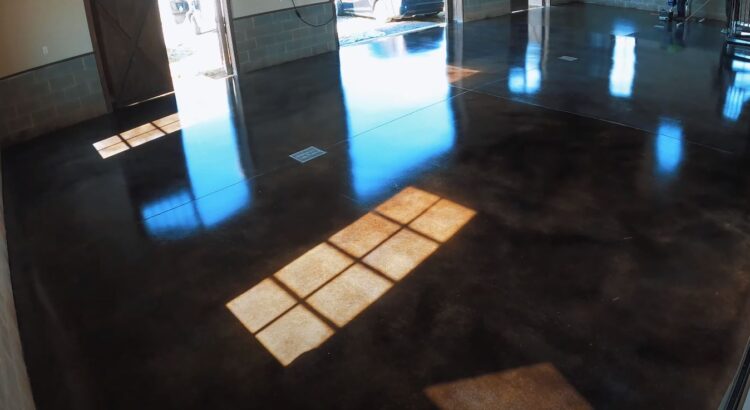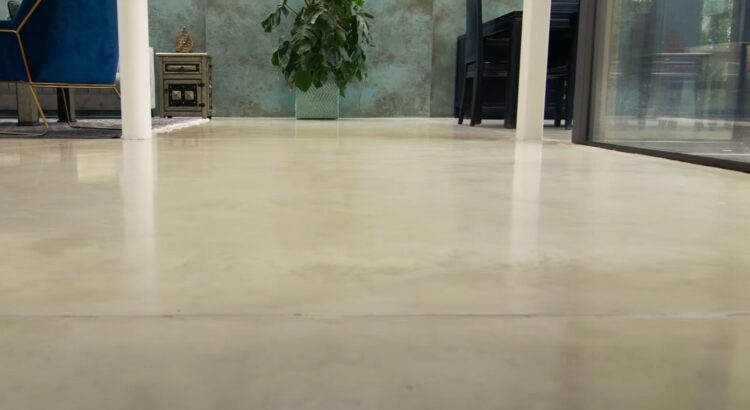Understanding Floor Repolishing in Auckland
Frequency of Floor Repolishing Curious about when to give your polished concrete floors a touch-up? The need varies based on foot traffic, the floor’s purpose, and the specific type of finish you opt for:
- High Traffic Areas: Every 2-3 years.
- Medium Traffic Areas: Every 3-5 years.
- Low Traffic Areas: Every 5-7 years.
Pricing and Options for Polished Concrete Flooring Auckland’s vast array of polished concrete flooring options cater to different aesthetic and functional requirements. Here are the main ones, with their respective costs:
- Grind and Seal: Involves a surface grind, followed by the application of a protective seal.
- Cost: NZD $80 – $120 per square metre.
- Honoured Finish: Gives the concrete a smooth, matte appearance.
- Cost: NZD $120 – $160 per square metre.
- Mechanical Polish: Involves grinding, honing, and polishing the concrete to achieve a high gloss finish.
- Cost: NZD $160 – $240 per square metre.
Health and Safety Measures in Auckland Selecting a polished floor goes beyond aesthetic appeal. It’s paramount that the flooring adheres to Auckland’s health and safety guidelines. Some essentials to note:
- Surface Slip Resistance: Ensure your chosen floor finish surpasses the recommended slip resistance values. Sometimes, ensuring this can elevate the costs, but it’s a non-negotiable for safety.
- Protection Gear during Installation: If embarking on a DIY journey, always equip yourself with the right protective gear. Costs generally range from NZD $30 to NZD $160.
Auckland Council Bylaw Insights Dabbling with polished concrete in Auckland requires a thorough understanding of the regional council bylaws. Here’s a snapshot:
- Type of Sealant: Certain neighbourhoods put restrictions on using specific high-VOC sealants. It’s essential to review the council’s stipulations before finalising your choice.
- Consent Costs: Consent costs can vary based on the suburb and the scope of work. Current averages float around NZD $1,550 – $3,100.
- Affected Suburbs: Regions like Waitākere, Manukau, and North Shore have distinct guidelines. Always reference regional council mandates for clarity.
- Specific Codes: It’s prudent to delve into the Building Act 2004 and the Resource Management Act 1991 to ensure all actions are compliant.
Summary Table of Costs
| Polished Concrete Type | Cost (per square metre) |
| Grind and Seal | NZD $80 – $120 |
| Honoured Finish | NZD $120 – $160 |
| Mechanical Polish | NZD $160 – $240 |
| Other Costs | Estimated Cost |
| Protection Gear (DIY) | NZD $30 – $160 |
| Council Consent | NZD $1,550 – $3,100 |
It’s always wise to engage professionals and obtain multiple quotations to gain an in-depth understanding of your flooring project.
Frequently Asked Questions on Polished Concrete Flooring in Auckland
What are the benefits of polished concrete flooring?
Polished concrete floors are durable, low maintenance, and offer a sleek, modern look. They can also enhance the natural light in a space due to their reflective surface.
How long does a polished concrete floor last?
With proper maintenance and care, a polished concrete floor can last for decades. High-quality sealers and regular cleaning can extend the lifespan even further.
Is polished concrete flooring slippery?
While polished concrete can appear glossy, it doesn’t necessarily mean it’s slippery. Properly finished polished concrete, when kept clean and dry, can meet slip resistance standards. However, like all hard flooring surfaces, it can be slippery when wet.
How do I clean and maintain my polished concrete floor?
For daily maintenance, dry mopping or using a microfibre pad to remove dirt is ideal. For deeper cleaning, use a pH-neutral cleaner. Avoid acidic or abrasive cleaners, which can damage the finish.
Is polished concrete suitable for outdoor areas?
Yes, polished concrete can be used outdoors. However, it’s essential to choose a finish that provides slip resistance, especially in wet conditions.
How does polished concrete flooring fare with underfloor heating?
Polished concrete is an excellent conductor of heat, making it an ideal choice for underfloor heating systems. It helps distribute warmth evenly throughout the space.
Can I change the colour of my polished concrete floor later on?
While the natural colour of concrete can be enhanced during polishing, changing its colour afterward is challenging. If you want a specific shade, consider integrating colour during the initial mixing or laying process.
How does the cost of polished concrete compare to other flooring options?
Polished concrete is generally cost-effective in the long run, considering its durability and minimal maintenance needs. Initially, it might be comparable to high-end flooring options, but its longevity offers good value for money.
Are there any Auckland-specific regulations I should be aware of?
Yes, regions like Waitākere, Manukau, and North Shore have specific guidelines for polished concrete. It’s crucial to familiarise yourself with regional council mandates and building codes.
Can polished concrete be repaired if it gets damaged?
Yes, minor scratches and damages can often be repaired. Depending on the extent of the damage, it might require re-polishing or patching. However, significant damages might need more extensive work or even replacement of the affected area.

